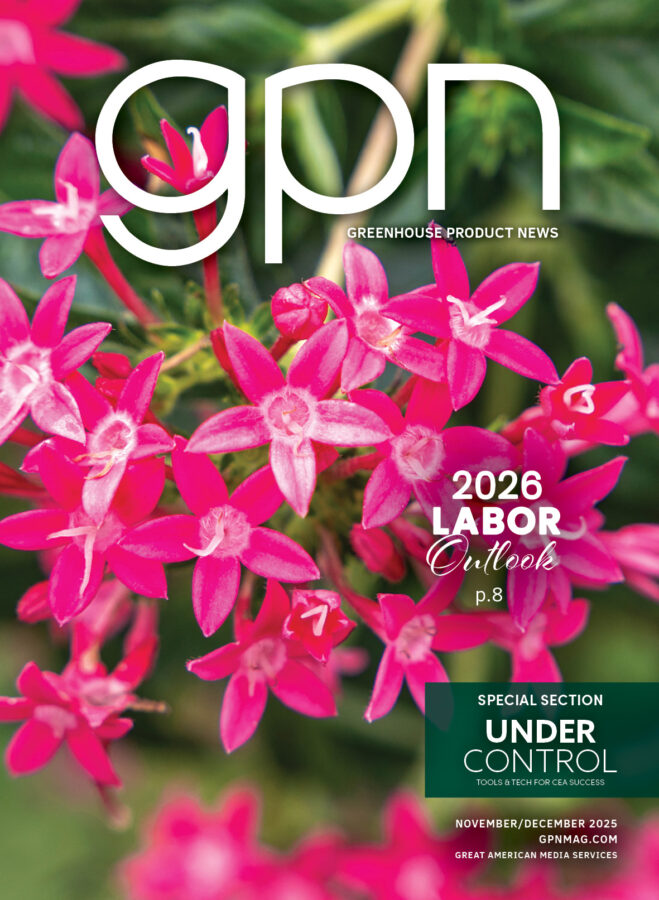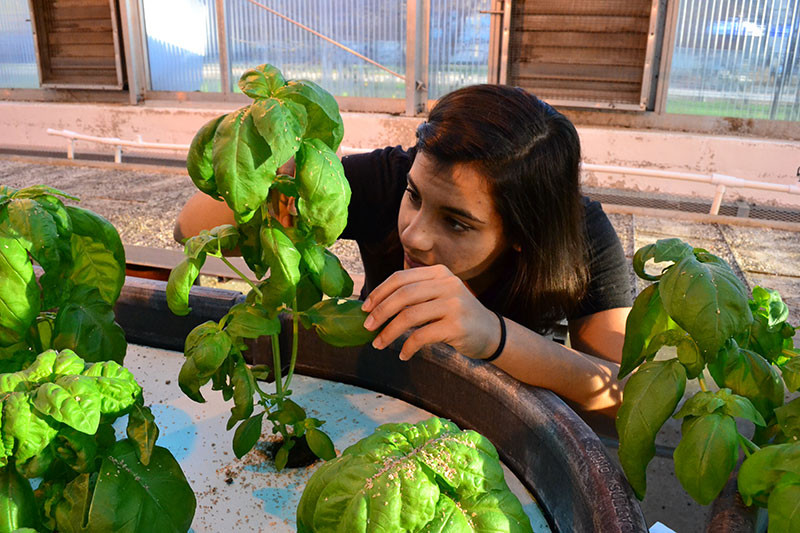
An Appetite to Grow On — Keirstan Kure 2016
Keirstan Kure’s path into the greenhouses at Penn State University (PSU) began when she was in high school. She did not grow up in a greenhouse or on a farm; she grew up in the suburbs of Cleveland, Ohio.
But while she was in high school, the seed for her future career path was planted during a health class. After watching a documentary on how food is produced in this country, she said to herself, “Wow, the food system is really messed up!”
That’s when she decided she wanted to get involved and pursue a career growing and producing food responsibly and efficiently. “And I come from an Italian family and we like to cook,” she jokingly adds.
Today, she is well on her way to creating a bountiful career path into sustainable food production — and she is the 2016 GPN/Nexus Intern of the Year.
Decisions, Decisions
Kure is a senior at PSU where she is majoring in Plant Science with minors in International Agriculture and Geography.
Her decision to study agroecology at PSU led to some thought- provoking and in-depth conversations with family members who did not understand why she wanted to get into that area of study. Reflecting on those conversations, Kure says some family members “looked at me like I had five heads.”
But she was bound and determined to pursue her dream of developing sustainable agriculture and food systems.
During her senior year in high school she began working weekends for Mackenzie Creamery, a rapidly growing local business in Hiram, Ohio, that makes and sells goat cheese. That job helped confirm Kure’s academic decision.
The owner of the company, Jean Mackenzie “was a very big influence on me,” Kure says. “She is very involved in the local food scene in Ohio and very big into sustainable agriculture.”
“Jean really helped educate me and show me the ropes on how the business operated” and what was really involved in succeeding in the business. She also worked at local farmers markets and got to see how the whole agricultural food system comes together.
So when she headed to State College, Pennsylvania, for her freshman year at PSU, Kure began to explore the different options that were available to help her pursue her dream. That’s when she zeroed in on plant science and agroecology.
Taking Initiative
“I can truly say that I have loved every minute of my education at Penn State,” Kure says.
Having not grown up in the horticulture/agriculture industry, she really enjoyed learning about all of the different aspects of growing crops during her first couple of years at PSU — from soil science to pest management to alternative cropping systems — “and all of the technical skills it takes to produce food.”
In the fall of 2014 she journeyed to Florence, Italy, to participate in the university’s Sustainable Food and Environmental Systems Program where she learned about Italy and the rest of Europe’s food system and how their production compares to the United States. Upon her return to the Penn State campus, she was on a quest to find another hands-on learning opportunity to help further her education and achieve her academic goals.
She met with Leslie Pillen, the Student Farm Initiative (SFI) coordinator at Penn State to discuss her options. Kure had participated in the SFI program prior to her semester studying abroad so she was familiar with its mission statement to “serve as a nexus for experiential learning about sustainability challenges and solutions in food and agriculture.”
Kure and Pillen brainstormed and came up with the idea of Kure creating a Pilot Hydroponic Student Farm in one of the university’s research greenhouses.
“We said, ‘We have all of this greenhouse space. Why don’t we do something with it?’ So in that split second we decided to make a hydroponic student farm happen in one of the research greenhouses,” Kure says.
And from there, Kure’s 2015 one-credit internship began.
The Fun Begins
That same evening Kure hit the ground running. She went home and immediately started doing her research and setting up meetings. She drafted a proposal to the college dean to get the project approved, contacted the greenhouse manager for input, researched hydroponics systems, and developed a list of materials and a budget for the project.
While Kure was launching the new growing operation, she also was helping to organize PSU’s brand new Student Farm Club with several other students and would soon become its president. The club would be an integral part of her internship, as its members would be engaged in growing the hydroponic crops. Not only would Kure be developing her own growing skills, she would also be working on her leadership skill as she managed and motivated the other Farm Club members who worked in the greenhouse.
It’s Grow Time
One of the main goals of this new indoor “farm” and the Student Farm Club was to produce food for Local Food Nights on the PSU campus. These events were special dinners prepared from locally sourced food. That meant Kure only had two-and-a-half months to meet the deadline of planting, growing, harvesting and delivering the crop to the first Food Night.
After receiving all of the necessary approvals from the university, Kure worked with the greenhouse manager, Scott Diloreto, to procure all of the equipment and materials she would need to set up a hydroponic growing system.
The growing system design was based on many of the resources that were already available in the greenhouse including the troughs, air pump and nutrients.
Kure put together a deep-water trough system using 10 50-gallon Rubbermaid cattle troughs. The troughs were filled with water and then a nutrient solution was added to reach the proper electrical conductivity (EC) levels. Kure says creating the nutrient solutions was a real learning experience, as she had to “experiment with and mix nutrient solutions to achieve a correct concentration and ensure the crops received the proper nutrients.”
Each trough was aerated with an 8-inch air stone connected to an air pump with aquarium tubing. Then, Kure created rafts cut out of sheets of Styrofoam insulation. Plastic baskets with seedlings were placed in the rafts so the roots would be submerged in the nutrient solution as they floated in the troughs.
The first crops Kure grew were romaine lettuce and basil. Consulting with Diloreto, using established practices and through some trial-and-error, Kure figured out the optimal growing conditions and timing to produce the crops. She also learned how to scout for greenhouse diseases and pests and use biocontrols to help improve crop quality.
“At least once a week, I had nightmares that the seedlings were dead or a plague of powdery mildew would wipe out my crop,” Kure recalls.
Food … and Food for Thought
Kure delivered the bounty of her first crop to the first PSU Local Food Night — on time! Less than 48 hours after the lettuce and basil were harvested, the produce was served with colorful tomatoes and drizzled with a vinaigrette dressing in one of the on-campus dining halls.
“It was so incredibly rewarding to see others enjoying the months of hard work and see the Penn State food system come full circle,” Kure says with pride.
Even though her internship ended, Kure continues to manage the hydroponic “farm” as part of the Student Farm Club’s activities. She says it continues to “produce food, foster future leaders, develop a local food system for the Penn State Community and support the goal of the Student Farm Initiative.”
She will graduate from Penn State University later this spring. She plans to pursue a career in international development in sustainable agriculture and food systems.
“I’m really interested in developing innovative and entrepreneurial food production in urban spaces,” she says. “That is the kind of work I would like to do.
“I think greenhouse production is going to be so incredibly important as we move forward and try to develop urban agriculture and more regional and local food systems.”
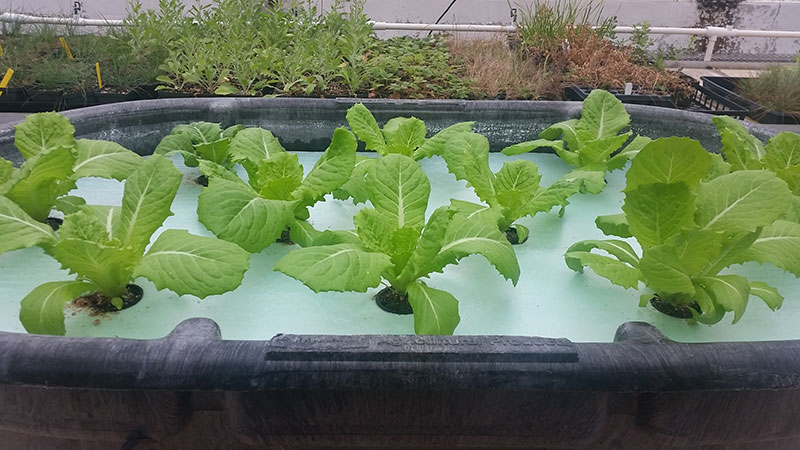
Tell, Teach, But Most Importantly, Involve
One of the decisions that we made 17 years ago was to shine a spotlight on the young people in our industry who were making a difference and who with a little attention could be even more successful.
I love reading the letters that the interns write about the semester or summer that they spent on their internship. You can see that moment where they went from learning something in the classroom to seeing what it means in a working greenhouse. You can see them going from the stage of “what do I want to do with my life,” to the niche that determines their whole future.
Benjamin Franklin said, “Tell me and I forget; teach me and I may remember; involve me and I learn.” Internships are the best way for young people in our industry to find the passions that will make them successful and happy. Keirstan Kure has been exploring classes, internships and jobs. In each of them she has found things that she loves to do and feels challenged to learn more about.
As in anything that is good, the rewards come back four-fold. Nexus is able to provide a scholarship to an intern, but, in doing so, we are able to give GPN readers an insight into what young people are thinking and wanting. We also hope people who have never considered providing an internship
to a student will see what it could mean to their business. They could have fresh eyes on an old project and new energy to make it happen. When I am at trade shows I frequently am told that this program opened their eyes to the many benefits of having an intern. In so many ways we all benefit.
Nexus is proud to have Keirstan Kure as the 17th recipient of the GPN/Nexus Intern of the Year Scholarship Award.
– Cheryl Longtin, CEO Nexus Greenhouse Systems








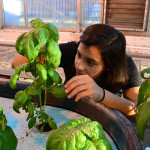
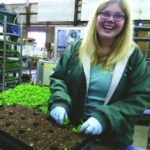
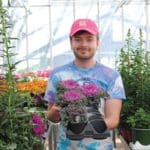
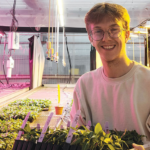
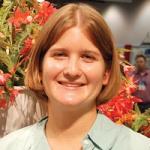

 Video Library
Video Library 

















